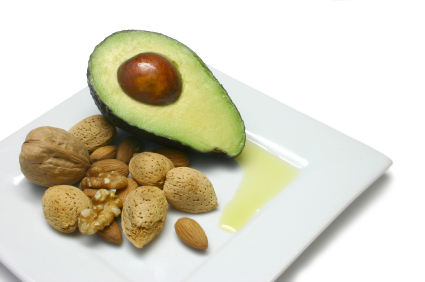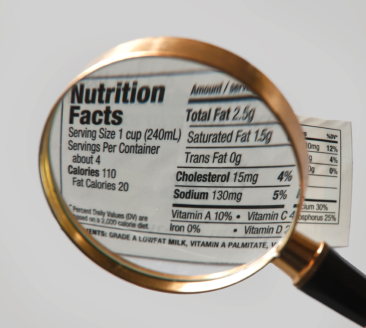Proteins, carbs, and fats are not alone! True, these are three of the six types of nutrients, but water, vitamins, and minerals each have important qualities as well.
Forms of Nutrients
Our bodies are composed of nutrients. The foods that we eat and drink help us to continuously nourish our bodies and replace lost nutrients and used energy (calories). The body uses nutrients for growth, repair, and maintenance.
Nutrients come in six forms: carbohydrates, proteins, lipids (fats), vitamins, minerals, and water. To put things into perspective, the body is approximately 60% water. The next largest percentage of nutrients in the body is fat (I know we all hate to hear that). Men are typically between 13% and 21% fat and women are usually between 23% and 31%. Protein, carbs, vitamins, and minerals make up the remaining percentages in our bodies.
The six nutrients can be broken down into those that provide energy and those that do not provide energy. Our bodies are able to pull energy from carbs, proteins, and fats. Remember, the term “energy” is synonymous with calories, so you will see that foods that contain carbs, protein, or fat all have a calorie counts associated with them. But although minerals, vitamins, and water do not provide energy, they are still very important.
Water
Water is more important to life than any other nutrient. It makes up 60 percent of a normal adult’s body weight. Children and lean adults usually have higher percentages of water in their body because water makes up 75 percent of lean tissue and only 25 percent of fat mass.
Water in the body has many important roles. Some of these include carrying nutrients and waste, acting as a lubricant, cushioning joints, and maintaining body temperature. These benefits make it important to remain properly hydrated. Although many think it’s ok to drink water only when you’re thirsty, thirst is not an adequate indicator of hydration. By the time the feeling of thirst hits, you’re already past the point of dehydration.
Although you may see recommendations for daily water intakes, there are many factors that affect daily hydration requirements. These include age, gender, activity level, and body composition. A good way to determine whether you are staying hydrated is by observing the color of your urine. The clearer it looks, the better.
Water is lost through perspiration, breathing, metabolic functions within the body, and through urination and stool. Excess loss of water impairs human performance, making the need for hydration all the more important.
You should be aware of times when water expenditure increases. Hot weather and physical activity increase water requirements. Water intake should also be increased as dietary fiber intake increases. This will help prevent constipation. Coffee, tea, caffeinated soda and alcohol all have a dehydrating effect.
To promote an increased water intake, try adding flavor packets, lemon, or lime to your water. It’s also a good idea to keep bottled water readily available. Remember, when you feel thirsty, you may already be partially dehydrated. The importance of water cannot be underestimated. This no-calorie drink provides vital nutrients.
Vitamins
The body needs small amounts of vitamins and minerals. In fact, vitamin doses are typically measured in milligrams or micrograms. By eating a variety of foods from each of the food groups, you provide just the right amount and mixture of vitamins your body needs.
Although they do not release energy, vitamins do assist with the release of energy from carbs, fats, and proteins. Almost all of the B Vitamins help the body use fuel from foods. Their role is to aid in energy metabolism. Vitamins C and E are popular as antioxidants. Vitamin A helps with vision, vitamin D with bone strength, and vitamin K with blood clotting. Almost all of the vitamins are obtained from our diets, except vitamin D, which can also be obtained from sunlight.
Vitamins are organic and perishable, therefore care must be taken when storing and preparing them. Otherwise, the vitamins contained in food may be destroyed through cooking or improper storage. Remember the following to minimize vitamin loss in storing and preparing foods:
- Refrigerate most fruits and vegetables
- Store cut fruits and vegetables in an airtight container or wrapper
- After opening juice containers, close and refrigerate them
- Rinse fruits and vegetables before cutting them to avoid washing nutrients away after they’re sliced
- When cooking, use very little water to steam or microwave vegetables. Add veggies after the water starts boiling, and use the leftover cooking water in other dishes.
- Avoid cooking foods at high temperatures for long periods of time
Minerals
Minerals have important roles too, but unlike vitamins, they are not easily destroyed. Sodium, chloride, and potassium help maintain a normal electrolyte balance. Calcium, phosphorus, and magnesium all help strengthen bones and teeth. Sulfate helps stabilize the shape of proteins in the body.
Like vitamins, minerals can be found in a variety of different foods. When considering the amount of minerals your body needs, the same rule mentioned earlier applies here. The single best way to ensure you get all of the minerals you need is to eat a variety of foods from each of the food groups. For healthy people who don’t have vitamin or mineral deficiencies, sensible food choices are a better source of intake than supplements.
 The Skinny On Fats
The Skinny On Fats